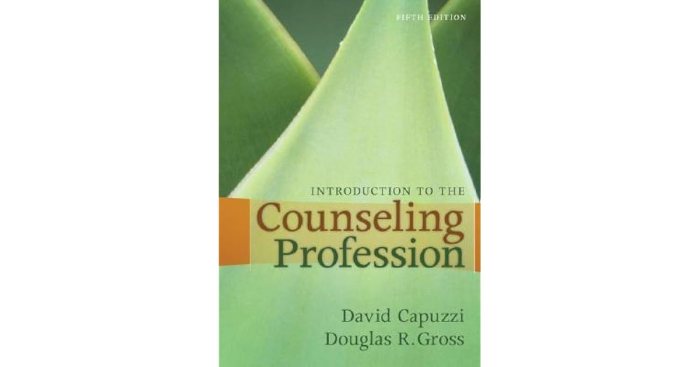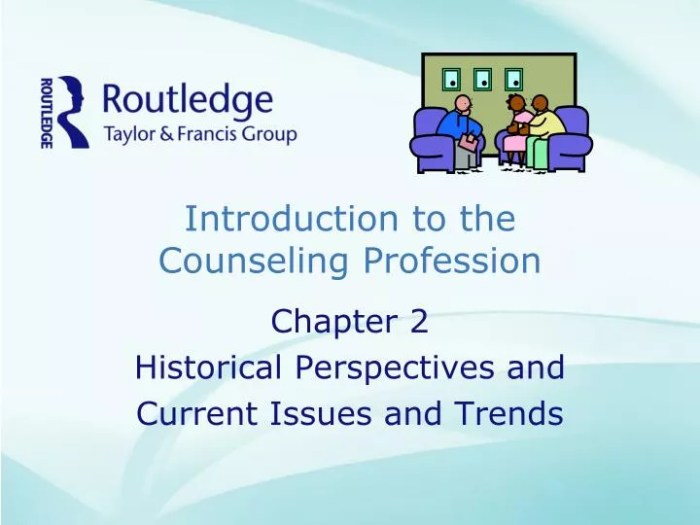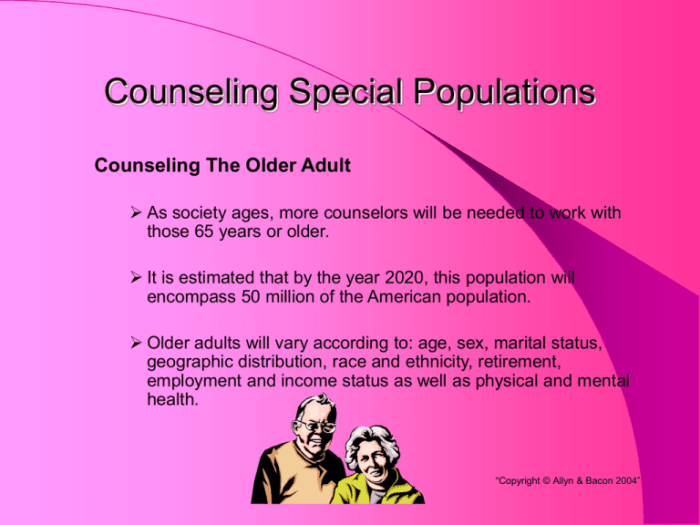Introduction to the counseling profession – Delving into the multifaceted realm of the counseling profession, this comprehensive introduction provides an immersive exploration of its nature, history, ethics, skills, settings, and future prospects. Embarking on this journey, readers will gain a profound understanding of the counseling profession’s transformative impact on individuals, communities, and society at large.
The counseling profession encompasses a diverse range of approaches, each tailored to meet the unique needs of individuals seeking support and guidance. From traditional talk therapy to specialized interventions, counselors play a pivotal role in promoting mental health, well-being, and personal growth.
1. Introduction to the Counseling Profession

Counseling is a collaborative process between a trained mental health professional and a client who is experiencing emotional, behavioral, or mental health challenges. The goal of counseling is to help clients improve their well-being, cope with life’s challenges, and achieve their full potential.
There are many different types of counseling, including individual counseling, group counseling, and family counseling. Counselors may specialize in working with specific populations, such as children, adolescents, adults, or families. They may also specialize in working with specific issues, such as anxiety, depression, grief, or addiction.
Counselors play a vital role in the mental health care system. They provide support, guidance, and education to clients who are struggling with a wide range of issues. Counselors can help clients improve their coping skills, manage their emotions, and develop healthier relationships.
2. The History of Counseling

The history of counseling can be traced back to the early days of civilization. In ancient Greece, philosophers such as Socrates and Plato used dialogue to help people understand themselves and their world. In the Middle Ages, religious leaders provided counseling to their followers.
In the 19th century, the development of psychology led to the emergence of counseling as a distinct profession.
Some of the key figures in the history of counseling include:
- Sigmund Freud
- Carl Rogers
- Abraham Maslow
- Virginia Satir
These pioneers developed theories and techniques that have had a profound impact on the field of counseling. Their work has helped to shape the way that counselors understand and treat mental health issues.
3. Ethical and Legal Considerations in Counseling

Counselors are bound by a code of ethics that guides their practice. These ethical principles include confidentiality, respect for client autonomy, and non-maleficence. Counselors must also adhere to the laws of their state or country.
Some of the most important ethical and legal considerations in counseling include:
- Maintaining confidentiality
- Obtaining informed consent
- Avoiding dual relationships
- Reporting child abuse
Counselors who violate ethical or legal standards may be subject to disciplinary action, including losing their license to practice.
Answers to Common Questions: Introduction To The Counseling Profession
What is the primary goal of counseling?
The primary goal of counseling is to facilitate personal growth, improve mental health, and enhance overall well-being.
What are the different types of counseling?
There are numerous types of counseling, including individual counseling, group counseling, family counseling, and couples counseling, each tailored to specific needs and populations.
What are the ethical considerations in counseling?
Counselors are bound by ethical principles that guide their practice, including confidentiality, informed consent, and non-maleficence.
What are the essential skills for effective counseling?
Effective counselors possess strong communication, listening, empathy, and problem-solving skills, as well as cultural competence.
